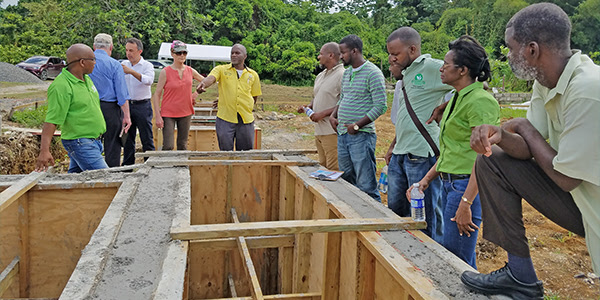
This information was provided by inmed.org
Send your Press Release here.
(KINGSTON, JAMAICA: 10/22/2018) Students, farmers and prospective entrepreneurs will soon have the opportunity to learn a pioneering adaptive agriculture technique that can provide food security, climate change resilience, income and community development through a new strategic partnership between INMED Caribbean and the College of Agriculture, Science and Education (CASE).
The partnership involves the construction of a large commercial-scale aquaponics system on the CASE campus in Port Antonio, Portland, to serve as a teaching tool for students studying adaptive agriculture, a resource for research and development, and a source of fresh produce and fish for the college’s meals program. The system also will be used as a demonstration and training tool for INMED’s Increasing Access to Climate-Smart Agriculture (IACA) program, which provides training and technical assistance in aquaponics farming, as well as links to financing and markets, to help small-scale farmers, women and youth start aquaponics enterprises in Jamaica. IACA program partners include the Inter-American Development Bank/Multilateral Investment Fund, Caribbean Development Bank, the Ministry of Industry, Commerce, Agriculture and Fisheries (MICAF), Rural Agricultural Development Authority (RADA), and the Ministry of Economic Growth and Job Creation (MEGJC).
Aquaponics is an innovative food production technique that combines aquaculture (fish farming) with hydroponics (soilless crop production in water) in a closed symbiotic system. Advantages of aquaponics include crop production roughly 10 times higher than traditionally farmed plots of equivalent size, up to 90% less water consumption than traditional irrigation, low energy consumption, year-round crop production and flood and drought resilience. Combined with access to financing, markets and other value chain opportunities, this climate-smart farming technology is considered a critical, sustainable strategy for reducing poverty.
As part of the demonstration system, aquaponics experts from INMED Caribbean will train CASE instructors in all aspects of aquaponics farming and will help develop course curricula specifically for CASE students. “While we’re focusing on developing current aquaponics farmers and entrepreneurs through our IACA program, this wonderful strategic partnership with CASE will allow us to expand our reach to future farmers and entrepreneurs among their students,” says Dr. Linda Pfeiffer, CEO of INMED Partnerships for Children, which pioneered the IACA concept.
“We appreciate the partnership between CASE and INMED to add aquaponics as a viable, climate-smart agriculture alternative to address food security and provide economic opportunities to the new generation of farmers in Jamaica,” says Dr. Derrick Deslandes, President of CASE.
The aquaponics system is currently under construction at CASE and is expected to be operational by year-end. INMED Caribbean and CASE recently held a launch event, which included representatives of the Caribbean Development Bank, the Planning Institute of Jamaica and RADA Portland Parish and several farmers participating in INMED’s IACA program.
“The launch of this aquaponics project is an exciting step for agriculture in Jamaica,” says Darran Newman, Division Chief (Ag.), Technical Cooperation Division of the Caribbean Development Bank. “It has the potential to transform the industry for the better and to help lift many citizens out of poverty. The Caribbean Development Bank is pleased to help bring such innovation to the agricultural sector through our support of this partnership between CASE and INMED.”



Leave a Reply